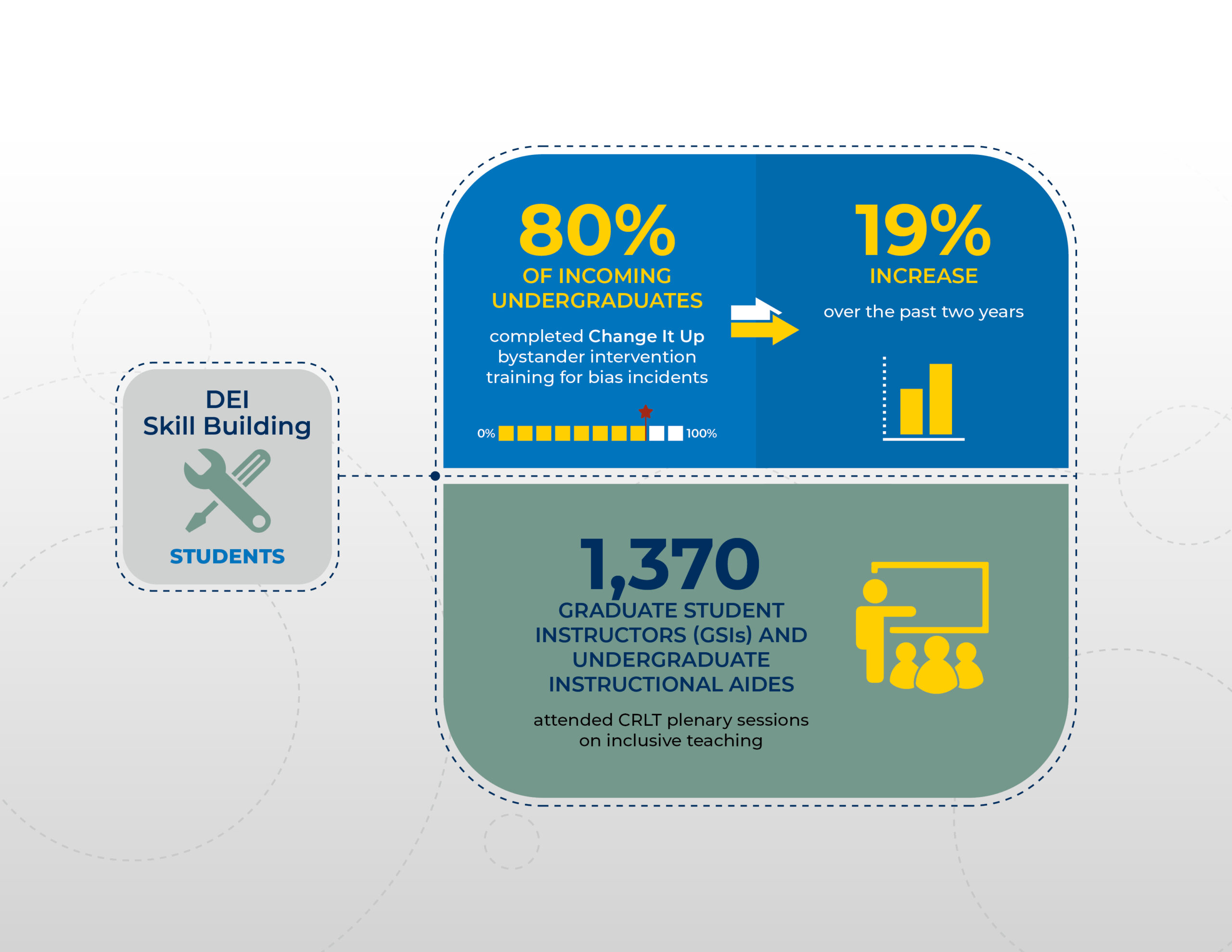The university will use data-driven best practices to increase capacity and improve its overall effectiveness in providing resources for student support and educational programming to improve the campus climate. In addition, student communications will focus on raising awareness about—and increasing utilization of—related resources, organizations and channels for reporting campus climate concerns.
Year Four Progress
In Year Four, Student Life continued to lead the shift from a framework of bias reporting to campus climate support, with a focus on building a stronger, more connected set of campus services. New initiatives included workshops in respectful communities; anti-racism and coalition building teach-ins; and training sessions in sexual assault policy and prevention, hazing, bystander intervention, and coping skills. During the pandemic, Student Life launched support services ranging from emergency financial assistance to tele-counseling, wellness coaching, and critical incident case management.
As a priority initiative, Student Life fast-tracked implementation of a flexible campus climate support model and maintained extensive communications with DEI Leads, Student Advisory Boards and other campus partners. We fast-tracked implementation of a flexible campus climate support model and maintained extensive communications with DEI Leads, Student Advisory Boards and other campus partners. This shift also included updates to all campus websites and the formation of an institutional Campus Climate Support Team, facilitated by the Dean of Students. These efforts were bolstered by expanding the successful “You Belong Here” digital ad campaign initiated by University Housing. Our conversations with 45 student organizations in preparation for the campus climate work associated with hosting the 2020 Presidential Debate (hosting was cancelled due to COVID-19), resulted in a Campus Climate Advisory Council (CCAC) to coordinate diverse student voices in advancing campus climate work.
Student Life also provided strategic support for students who, through the 2016 climate survey, reported low levels of meaning and belonging on campus. In partnership with student organizations and institutional units/departments, MESA led efforts to expand their successful grants program: increasing not only student access to funding for peer-led programming but also adding and strengthening programs focused on race and ethnicity-related topics. In year four, MESA’s new large grants program provided $43,000 in programmatic support distributed across 13 grants, while the small grants program received over 100 applications and awarded $49,318 via 72 grants.
Student Life’s deep set of Social Justice Education and Intercultural Development offerings continue to provide essential support to curricular and co-curricular spaces. Year four highlights include:
- Launch of the second pilot phase of the Engendering Respectful Communities initiative, a partnership with Rackham, with three workshops presented to 120 students in the Chemistry, English, and History departments.
- Collaborative trainings for high-impact/high-influence student groups on well-being, sexual assault policy and prevention, hazing, and bystander intervention skills. Student group trainings included Fraternity and Sorority Life ( 938 students), Michigan Marching Band ( 376 students), ROTC ( 58 students), Athletics ( 945 students), Club Sports (509)
- Expansion of Being Well Now: Coping and Resilience Skills for College Students
- Implementation of peer-led Anti-Racism and Coalition Building teach-ins
As we seek to meet emerging needs during a global pandemic and a national call for racial justice, our collective work has become more essential than ever. Since mid-March, with students confronting complex personal and community challenges, we have focused on community care by:
- Providing nearly $90,000 in emergency financial assistance to 128 students
- Supporting over 400 students through critical incident case management services
- Meeting with students through 3,243 tele-counseling appointments, 354 online screenings, and 130 virtual wellness coaching sessions.
- Connecting with over 10,000 students through the Student Well-Being website
- Supporting 500 shoppers at the Maize and Blue Cupboard
- Engaging thousands of students through online office hours, chat programs, and virtual events.
Additionally, we advanced assessment of our campus climate work by implementing divisional measures for meaning and belonging, allowing for more pre- to post-test survey matching in our Student Learning Outcomes Assessment surveys, and introducing new tracking techniques to gather information continuously, year round. Results will be used to identify and expand programs that are most effective for increasing students’ sense of belonging.
Looking ahead to Year Five, we are focused on delivering a public health-informed residential term. Student Life is situated in a critical position to support and guide the development and implementation of the “Wolverine Culture of Care” framework, in which community expectations and commitment are the foundation for broader community harm reduction strategy.
Responsibility: Division of Student Life
DEI Skill Building
